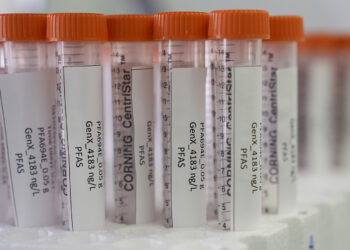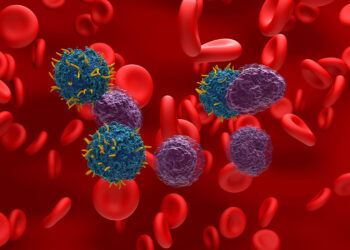TOPLINE:
Endoscopic ultrasound-guided radiofrequency ablation (EUS-RFA), a novel minimally invasive therapy, offered a safe and effective alternative to total adrenalectomy for the treatment of left-sided aldosterone-producing adenomas (APAs), with the potential to completely cure primary aldosteronism and hypertension.
METHODOLOGY:
- Recent advancements in molecular imaging, especially with [¹¹C]-metomidate PET-CT, offer a non-invasive approach for localising aldosterone-producing nodules for targeted treatment.
- Researchers conducted FABULUS, a feasibility study to examine the safety and efficacy of EUS-RFA, a non-surgical, adrenal-sparing treatment for left-sided APAs.
- A total of 28 adult patients with primary aldosteronism (mean age, 57.7 years; 25% women) and confirmed left-sided APAs underwent 35 ablations on one or two occasions; all participants received combined alpha- and beta-blockade for 2 weeks before the procedure.
- Participants underwent molecular imaging with [¹¹C]-metomidate or para-chloro-2-[¹⁸F] fluoroethyletomidate PET-CT before and 3 months after the intervention to assess the extent of ablation.
- The primary endpoint was safety, assessed by the occurrence of major hazards — perforation, haemorrhage, or infarction of major organs — within 24-48 hours post-ablation; secondary endpoints included reductions in radiotracer uptake by the ablated APA at 3 months and biochemical and clinical success at 6 months post-procedure.
TAKEAWAY:
- All nodules detected on PET-CT were effectively accessed using biopsy and ablation catheters; no major hazards — perforation, haemorrhage, or infarction of major organs — occurred in any patient.
- At 6 months post-ablation, 21 participants (75%) achieved complete or partial biochemical success, whereas 12 (43%) achieved complete or partial resolution of hypertension.
- The aldosterone-to-renin ratio decreased by a median of 77% (P
IN PRACTICE:
“On a population level, the biggest benefit might just be for the average person with primary aldosteronism who wants definitive treatment but is not inclined to invasive investigation or surgery. And for those with minimal response to radiofrequency ablation, AVS [adrenal vein sampling] or adrenalectomy could still be pursued as a second-line option,” experts wrote in an accompanying editorial.
SOURCE:
The study was led by Giulia Argentesi and Xilin Wu, of the Department of Clinical Pharmacology and Precision Medicine, William Harvey Research Institute, Queen Mary University of London, London, United Kingdom, and was published online on February 7, 2025, in The Lancet.
LIMITATIONS:
The study’s small size may have affected the generalisability of the findings. Follow-up was restricted to 6 months, a relatively short period for assessing long-term outcomes and potential recurrence of primary aldosteronism. The study primarily targeted left-sided APAs, limiting the generalisability of the findings to right-sided APAs and other forms of primary aldosteronism.
DISCLOSURES:
The study received support from the National Institute for Health and Care Research Biomedical Research Centres at Barts, University College Hospitals, Cambridge University Hospitals, Barts Charity, and British Heart Foundation. Some authors reported receiving research grants, funding, or honoraria or having other ties with certain institutions and companies.
This article was created using several editorial tools, including AI, as part of the process. Human editors reviewed this content before publication.
Source link : https://www.medscape.com/viewarticle/endoscopic-ablation-future-adrenal-care-2025a10003v3?src=rss
Author :
Publish date : 2025-02-18 12:00:00
Copyright for syndicated content belongs to the linked Source.














